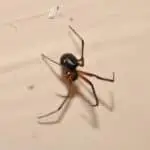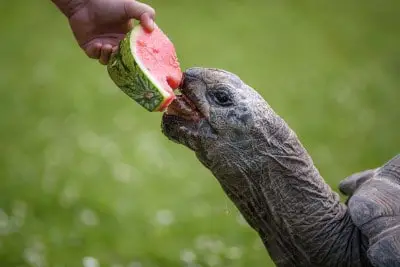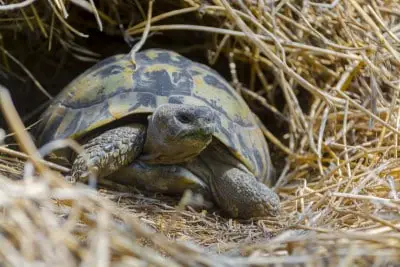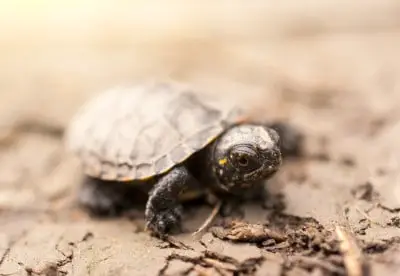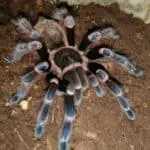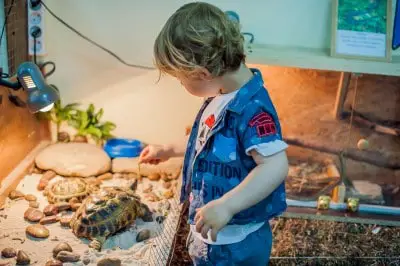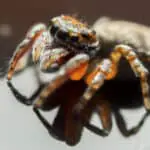Excretion is a crucial indicator of a healthy animal and proper digestion. If a tortoise has an illness, it will show in the appearance and frequency of the poop. Therefore, as an owner, you would want to know how to determine your tortoise’s health status by observing its excrements.
Tortoise poop color ranges from green to brown and has a distinct but non-repulsive smell. The frequency of excretion depends on the tortoise species, size, and diet. A healthy tortoise will excrete occasionally, but if not, you can try remedies such as soaking, adding laxatives in their diet, or consult with your vet.
Let’s go into more details about a healthy tortoise’s poop.
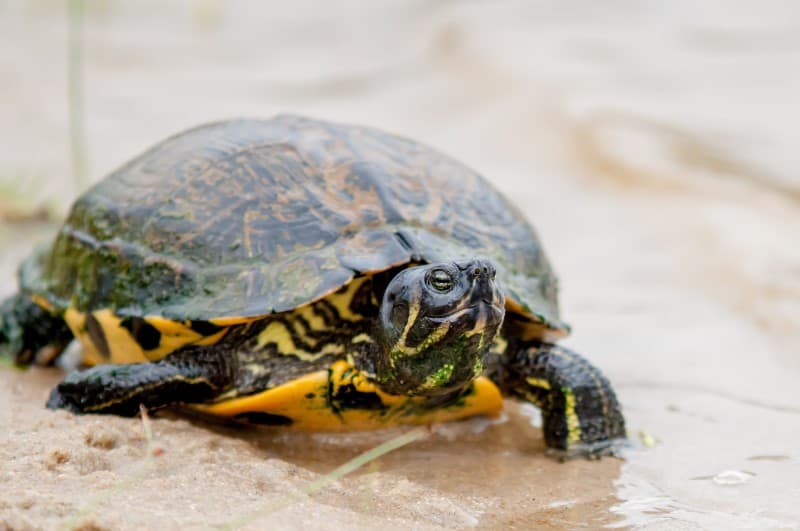
What Does Tortoise Poop Look Like?
Not all tortoises poop the same; the poop’s appearance depends on the tortoise’s species, age, size, and diet. We cannot dictate the exact appearance of every tortoise. Generally, the excrement may be green, brown, or a mixture of both due to the vegetables’ color in their diet. If the tortoise is healthy, the poop should be a compact mass and have a distinct smell.
One exciting feature about the tortoise is that it poops and urinates through one opening. Hence, the excrement may have a different color and is at times runny due to the wetness. When peeing, tortoises also release urates. These creamy substances are a by-product of protein digestion. If the tortoises eat a lot of protein-rich foods, they will have more urates in their pee.
Consequently, you will notice a white coloration. You may be alarmed as a new owner, but your pet is perfectly healthy; it pooped and peed at the same time; hence, the white color. However, you only need to limit the level of proteins in their diet because, in excess, it may suffer from pyramiding, a condition that makes the shell scutes bulge outwards. You can provide more leafy greens instead and avoid other fatty protein pet feeds.
If you think that your tort’s poop has an abnormal color or notices blood or worms in it, it is wise to seek immediate medical attention. Your pet may be suffering from a severe illness or has a glitch with its digestive system. The truth is that most tortoises are hardy, with high immunity, given their living conditions in the wild. However, they fall sick, and it may end up being fatal unless you get an expert opinion.
Does Tortoise Poop Smell?
Many people complain of the foul smell from their pet’s enclosure. They say that the stench disrupts their sleep as it occupies the entire room. Therefore, first-time keepers would want to know what is in store for them before they bring in a pet.
Tortoise poop can be smelly, depending on their diet. However, it is mostly not pungent, and you may have to be very close for you to perceive it. The smell intensity also depends on the tortoise species; some have more repulsive odors than others, even without eating bad food.
For instance, the desert tortoise’s poop is not very smelly unless it piles up without cleaning. Leaving poop for a long time attracts bacteria, which contribute to a pungent smell. If you pick up the droppings immediately, you may not even smell the poop at all.
The bottom line is that all excrements have a distinct smell regardless of the species. It may only get unnoticeable with improved cleaning and an appropriate diet. In other cases, you may smell a terrible odor in the enclosure, but it isn’t necessarily a poop smell. It may be from another source like the reptile’s substrate.
When wet, the poop attracts bacteria, which emits a foul odor. If you regularly replace it, ensuring that it remains dry, it won’t stink. Also, ensure that the tortoise is dry before placing him in the vivarium, particularly after a bath.
Another reason for the foul smell may be due to the rotten food particles which you can easily mistake as poop. Tortoises tend to hide some food in their tank or leave bits behind after eating. Given the tank’s humid nature, this food ends up rotting quickly and releasing a foul smell. Most would mistake this stench for poop smell.
Additionally, unwashed water dishes can accumulate dirt and food particles which get smelly over time. Some keepers only top up the water but forget to wash the dish.
Therefore, proper hygiene is the best and only way to deal with foul smells in your tortoise’s enclosure. You should pick up the droppings as soon as you spot them to prevent the smell.
Secondly, wash the tank frequently and clean any objects like toys and dishes. Remember to regularly wash and soak your buddy in clean water to eliminate underlying food and waste particles. With these tips, you will never complain about a foul smell from your pet’s enclosure.
Read more: Do Tortoises and Turtles Smell
How Often Do Tortoises Poop?
Just like the appearance, how frequently a tortoise poop depends on the individual. It may be once a day, once a week, or take two weeks. Your tortoise may indulge in heavy eating but take some time before it excretes, all depending on its system. This case also applies to peeing, but mostly, the excretion is a mixture of poop and urine. If your tortoise is okay and takes a couple of days before excreting, you don’t need to worry. Similarly, if it happens as if scheduled, your pet may be healthy.
The only problem maybe if it is inconsistent or if it has changed drastically. If you notice that it has been a long time and your pet is reluctant to eat while seeming lethargic, perhaps something is amiss. The frequency of the poop and the tortoise’s demeanor can tell you a lot about your pet’s health.
In other cases, your pet may be pooping normally, but you won’t notice it in the enclosure because they tend to eat it soon after. The thought of it may gross you out, but, it happens, particularly in the wild.
If you don’t want them to do it, you can make a point of cleaning up as soon as you spot it. They may eat it if you leave it there; besides, it is only a hygienic practice.
Secondly, your pet may fail to poop if it has a digestive issue such as compaction. It is a severe case where the tortoise fails to release excrements due to blocked digestive tracts. It primarily results from the type of food they eat or from a tract blockage.
To help, you can visit a dentist or try at-home remedies like laxatives. If left in that state, your pet may die because food won’t pass in their system, and they won’t eliminate waste.
Do Tortoises Poop a Lot?
The amount and frequency of an animal’s excretion go a long way to determine its health status. Depending on the type of animal and its species, some may poop a lot more than others. Your favorite reptile is famous for rarely excreting, thanks to its genetic composition and digestion abilities.
Healthy tortoises may poop a couple of times a week or just once, depending on the species. The poop amount also differs. Some owners claim that the size is approximately that of the tortoise’s head. Typically, giant tortoises are known for excreting more than smaller ones. It may be accurate judging that they eat more, and their anatomy also allows it.
Tortoises don’t have many droppings unless the individual’s digestive system is like that or the animal is enormous. As long as they do it once in a while and there are no indicators that they have health issues, the frequency and amount of poop should not worry you.
How Can I Help My Tortoise Poop?
Your pet’s poop is a direct indicator of its health. If there is any abnormality, then something may be wrong. These signs include failing to poop, diarrhea, or hard stool.
The only at-home remedies you can deploy are; soaking, providing laxatives, and boosting their diet with proper food and water. Impaction is a severe condition where the digestive tracts block, limiting the movement of food or excrements. Any pet owner will be concerned if their pet isn’t pooping at all.
The first effective remedy is soaking. Tortoises are known to poop when in water, as it seems to relax their bowels. Ensure that the water is warm before you dip them inside, and after some time, they may get comfortable and poop.
Another remedy is feeding them natural laxatives such as bananas or pumpkin. These foods can ease their bowels and manage worm infestation. If all these remedies fail, the last resort is to visit the vets to have them unblock the alimentary canal.
If you wait any longer, it may prove fatal for your pet as the condition prevents them from eating or passing waste. Your pet may also have issues with passing stool due to dehydration.
Water is a necessity for fast and smooth digestion, and, if absent, your pet may fail to excrete. Even if it does, the waste will be crusty and uncomfortable for them. The only solution is to provide more water and supplement it with water, fruits, and vegetables.
Do Tortoises Poop When Scared?
Interestingly, tortoises can excrete when they perceive danger as a defense mechanism hoping that the poop would scare you. Stress and rough handling can also make them poop or pee. Hence, expect them to defecate in these instances. If you create a conducive environment where they are comfortable and handle them well, they won’t have to be scared. Desert tortoises are primarily known to get scared by the slightest threat.
Improper handling can scare wild desert tortoises to death. When extremely frightened, they will empty their bowels, leaving their bodies without water reserves. If they fail to get water as soon as possible, they may die from dehydration. Those in captivity are safer because their owners will always provide food and water.
It happens mostly to hatchlings than mature adult tortoises. Adults are not as easy to scare as baby tortoises. For the reptiles in captivity, their biggest threat is handling or a change in the environment since there are no predators around. If you bring in a new tortoise, especially a baby, you need to be very patient with them. They may poop when you handle them because they view you as a predator.
They are timid and unfamiliar with a human touch; therefore, you need to be cautious when handling them. You also need to slowly establish trust to make your pet grow fond of your presence. The best place to start is to tenderly rub them for a couple of days as you gradually start to hold them. Eventually, the scared pooping will stop, and they will be okay to your touch.
Why Do Tortoises Poop in Water?
Science doesn’t offer a specific answer to why tortoises are in the habit of pooping when in water. You can only rely on people’s experiences and observations. Notably, getting their feet wet triggers bowel movement. They find it the best time to expel waste when you bathe them or soak them. It happens suddenly and as if on cue, making it difficult if you intended for a clean soak. You then have to replace the water before your pet gets infections.
One logical explanation for this is that the tortoises have obtained the behavior from the wild. Also, they enjoy pooping in running water because they are sure the waste will wash down the stream. They are aware that they will not get infections if their droppings drain away. Secondly, others believe that the water relaxes them and consequently enables them to relieve themselves. Warm water particularly soothes them and eases their bowels, and they unintentionally poop.
Owners can take advantage of this and somehow potty-train their pets to poop whenever they are in the water. This feat is achievable, only that it becomes problematic to bathe them; they will keep pooping in the water, and you will have to replace it continually. We advise you to soak your tortoise whenever you can to keep them hydrated. The water effectively helps in their digestion and helps keep impaction at bay. As a result, your tortoise will find it easy to digest food and excrete.
Also read: Do Tortoises and Turtles Fart?
Lastly
We cannot precisely dictate how your pet’s poop should look. It varies depending on its species and size. What we are confident about is that it shouldn’t have traces of blood or foreign material. You can only help by providing the right food and water, and if you notice any abnormalities, it is best to consult an expert on the way forward.
More tortoise facts here:

